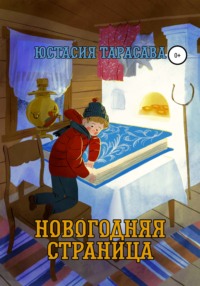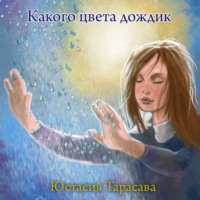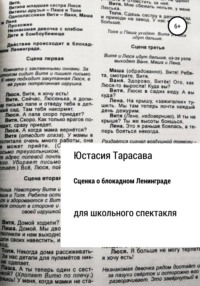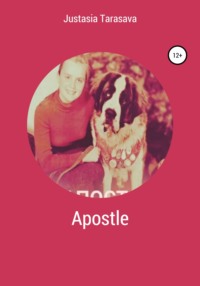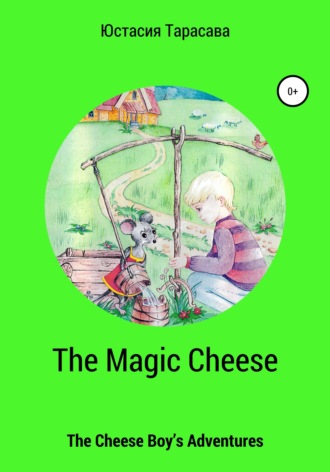
Полная версия
The Magic Cheese

Юстасия Тарасава
The Magic Cheese
Once upon a time there was a Cheese Boy. Actually, his name was Vovka. He was quite an ordinary boy and not made of cheese at all. He just loved it very much. Well, tastes differ, you know. So do people. There are potato, bread, egg and milk folks, as well as meat and fish ones. Needless to say, the majority belongs to chocolate, cake or ice-cream people. But Vovka was a cheese person and his friend Ljoshka – a potato one. To tell the truth, at first Ljoshka didn’t like potatoes at all, but that is another story and we won’t tell it now.
As for Vovka, he liked cheese since he could remember himself. When Vovka became old enough to help his Mama and go out all by himself, he would do the shopping on the ground floor of their apartment building (because they had a grocery store there) almost every day. Usually he bought everything that his Mama had told him to buy – and some cheese. He knew all sorts of cheese. Not all the sorts in the world, of course, only the ones that were sold in shops. He never mixed them up. One glance was enough for him to tell whether it was Poshehonskij or Radonezhskij, Altaiskij or Lamber, Yaroslavskij or Edam, Kostromskoj or Gollandskij, Gornij or Rossijskij, Swiss cheese, brynza, Camamber or any other.
Naturally, shop assistants nicknamed Vovka the Cheese Boy. ”There he is again,” they would say. “He must have a large family to buy cheese every day!” They didn’t know that Vovka’s family was small, only his Mama and he himself. Well, of course, he had Grandpa and Grandma, and also Uncle and Aunt, but they lived so far and visited them not very often. Vovka lived with his mother and had cheese all for himself. Now, don’t think he was that greedy. The reason was simple – Mama didn’t like cheese and almost never had it. Sometimes (very seldom, though) she could try a little, but Vovka always had the most of it. He was able to eat more than half a kilo at once. But not only that – he could also make different tasty things of it: cheese-sprinkled potatoes, spaghetti, meat, fish or eggs – anything that could be cooked in a hot frying-pan. Then there were sandwiches – hot or cold, cheese salads, cheese sticks, cheese balls, cheese dumplings and cheese rolls, fried cheese in bread crumbs, cheese pan-cakes and tomatoes stuffed with cheese (sweet pepper, lettuce and eggs as well). Vovka even baked a cheese cake several times. No wonder he was called the Cheese Boy at home as well. Mama would always say, “How can you eat so much cheese? Aren’t you sick of it?” But Vovka was never sick of cheese. So, Mama only sighed, “All right, you may have it. Cheese is good for your health. It would be better, of course, if you also had milk, kefir, cottage cheese and sour cream. But if you don’t like them, eat more cheese. And don’t have only cheese – add some apples, carrots and walnuts, and make a salad out of it.”
Mama would always worry that Vovka didn’t eat properly. She was a pediatrician and didn’t like it when children ate little healthy food. Or (which was even worse) when they had unhealthy things, too sweet or salty. Mama – doctor would always criticize other Moms, when they gave their children too many sweets. Vovka’s Mama was strict and serious at her work, but at home she laughed a lot, and Vovka was glad that his Mama was so cheerful. It wasn’t like that all the time, though. Other children’s mothers scolded and sometimes punished them, but Vovka’s Mama wouldn’t say a word when she was angry, and then Vovka wished she would scold and punish him. Sometimes Mama didn’t laugh, only sighed, and that was when she felt very tired. She was responsible for a lot of children, and when they got sick, she had to come to everyone and prescribe the treatment. On those days she would come home, have a seat and wouldn’t say a word for a while. She would only say that her legs couldn’t walk anymore. When Vovka was little, he wondered what had happened to Mama’s legs. But later he began to understand that grown-ups talked that way when they were very tired. He had learned that when Mama’s legs couldn’t walk, they had to be put in a tub filled with water. Then Mama would get some rest and become cheerful again, and also surprised with how much cheese Vovka had eaten. And she would surely worry whether his stomach was all right. All doctors believe that there is always a chance to get a pain of some kind, especially when you have eaten too much of something tasty.
One day Vovka went to the store to buy some cheese, biscuits and sooshkas (bread-like doughnuts, only dry and hard) for his Grandpa and Grandma, because they had promised to call in. Grandpa and Grandma liked having tea. They would stay in the kitchen together with Mama for the whole evening and have tea until they were tired. Grandma liked dipping biscuits in her tea and Grandpa enjoyed crunchy sooshkas. All his false teeth were of metal, so it was easy for him to eat hard stuff.
So, Vovka went to the store. He thought of buying something for Uncle and Aunt, but then decided against it. You could never tell for sure, whether they were going to come. Uncle and Aunt had promised to call in so often, but then they had never had. Nevertheless, they could come without telling about it, and no one really objected. Uncle and Aunt had their own business and not much time, and everybody understood that. When they did come, they would always bring lots of tasty things, especially when no one expected them.
That was the reason why Vovka didn’t buy anything for his Uncle and Aunt. He decided to buy a chocolate bar for Mama instead. He thought that Uncle and Aunt might not come, but Mama would for sure – and she liked chocolate. It made her cheerful, and she often had it. Even when there was no chocolate left, Mama would smell the paper it was wrapped into and smile.
Vovka thought that over and bought biscuits, sooshkas and a chocolate bar. He did that rather fast. Buying cheese was a harder task, though. Vovka spent a lot of time standing in front of a shop window. The sorts of cheese were so many and it was so hard to pick up only one. There were white cheeses, yellow cheeses, with or without holes in them, soft cheeses, hard cheeses, smoked and salty ones and also curd cakes. Even the shape was different – round, rectangular or sliced. There were cheeses for a picnic, cheeses for tea and for a snack. And oh, how they smelled! Vovka even closed his eyes and shook his head.
When he opened his eyes again, he saw an old lady, but such a strange one that he even forgot which cheese he had chosen. The old lady was wearing an old-fashioned dress, the one that could be seen only in old movies or in a museum. Her hat was old-fashioned, too. Sometimes Vovka saw ladies that wore hats, decorated with flowers or bows. But on the old lady’s hat there were tiny cows and calves, sheep and lambs, and goats – all with little bells hanging on their necks! Vovka’s mouth went wide open.
The old lady paid no attention to him and started to read the labels, following them with her hand in a glove – that way it was easier for her to read, Vovka guessed. He looked at her strong glasses and felt sorry for the old lady – the letters were so small and she was straining to read them.
”Can I help you, madam?” asked Vovka.
The moment he said that, the old lady suddenly vanished, as if he had never seen her before. Vovka was completely amazed! But also another wonderful thing happened – a new sort of cheese appeared in the shop window. Vovka had never seen this one before. On a bright yellow wrapper it was written with red letters: “Magic Cheese, weight 200 gr.” There was also a smiling little mouse on the wrapper. It even seemed to Vovka that the mouse winked at him. Well, of course, it could not be real – had anybody ever seen winking mice? Suddenly Vovka wished to try this magic cheese so strongly that he took it and went straight to the cash-desk. But, strangely enough, a cashier didn’t take any money for it.
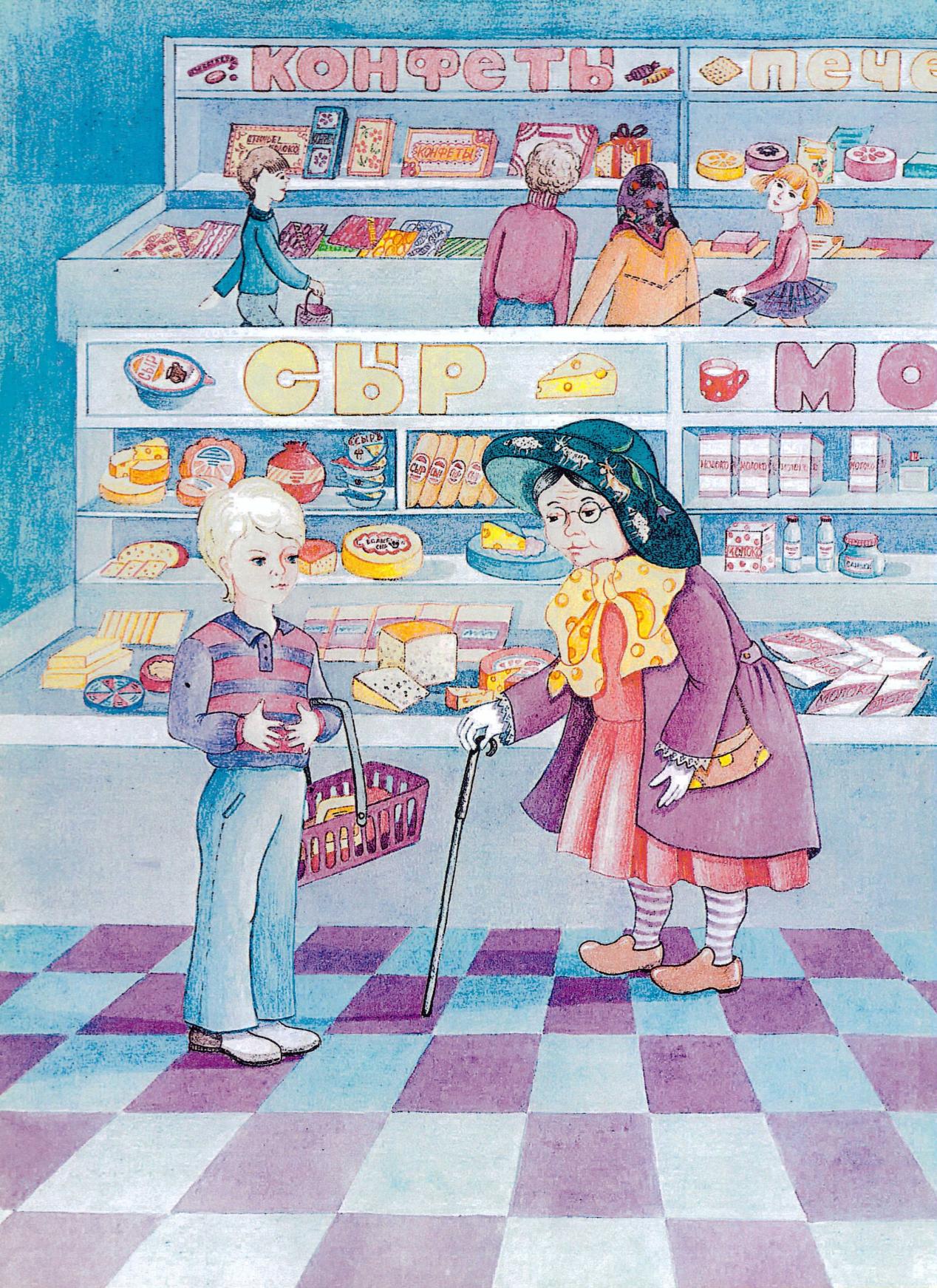
At home Vovka washed his hands first – after all, he was a big boy to know about bacteria. Then he went to the kitchen, turned the kettle on and put cups and saucers on the table: for Mama, Grandpa, Grandma, and for himself. He put biscuits and sooshkas into a biscuit dish and got a sugar-pot. As for the cheese, Vovka sliced it thinly and laid on a plate. He couldn’t help having a tiny slice of it. “What an unusual smell!” he thought in amazement. “It doesn’t smell like cheese at all – it smells of summer, flowers, apples, water-melons, a little bit of a damp forest where mushrooms grow, loud splashes of water on the river, fresh milk that you drink before going to bed. And at the same time it smells of Christmas, of a Christmas tree, decorated with tangerines and brightly-wrapped candies, of a goose roasted in an oven, merry Christmas carols singers, frosty air that pinches your cheeks when you slide down the hill. Wow! How can they make cheeses like that? I’ve never had anything like that in my whole life! I wish I could take a glance at how they make it,” thought Vovka.
Immediately the usual kitchen surroundings vanished somewhere, and Vovka found himself in a huge green meadow. The boy was absolutely confused. Only a minute ago he was making tea at home and then – imagine that! – he was in a meadow! And oh, what a meadow it was! The grass was thick, bright and rich, and it was coloured with flowers – blue, yellow, pink, purple, white and red, large and small ones. They made the meadow look like a fine carpet. There also was a path across this flowery carpet, but not a single person anywhere. Vovka couldn’t even ask anyone what kind of a place he got at. And, which was more important, how did he get there? Surely, it was some kind of magic. Vovka thought that perhaps he was only dreaming and pinched his hand. It became white, then red – no, a bruise wasn’t a dream at all. The boy looked around again and walked along the path decidedly.
Vovka had never seen such amazing paths before. It was very much alive and joyful. It seemed to Vovka that the path was playing with him, slightly pushing the boy ahead. But of course, that couldn’t be true, just because it couldn’t be true at all. Still Vovka thought that only such paths were able to ‘lead’ you. This one was really doing that! Vovka had no idea what kind of a place it was, but he enjoyed it. On both sides of the path there were trees. They grew thicker and thicker until they turned into a real forest, and into a rather strange forest, one should say. Tiny yellow, orange, pink, red, green and blue birds were sitting on the branches of the trees. There was even one purple bird. All of them were singing about something kind and good, and these songs filled Vovka with joy and strength. The warm wind caressed the boy’s face, and brought fruit and (for some reason) honey fragrances. In the thick grass bright flowers were blooming and butterflies of many colours were flying over them. Beautiful green trees grew in the forest and almost all of them were in full blossom. Those that were not had ripe juicy fruit on their branches – cherries, plums, apples, pears, oranges, apricots, figs and many others. Well, even a small child knows that all these fruit trees can’t grow at one place and bear fruit at the same time. This isn’t possible and such cases are unknown to science. But Vovka saw that with his own eyes and even could touch the trees. Every time he would exclaim, “That cannot be!”, wondering at this miracle, an orange or some other fruit dropped into Vovka’s palm. Yes, this forest was truly magic. Its trees seemed to understand human language and gladly treated the boy to their fruits. Vovka wasn’t hungry yet, and he also remembered well that in magic gardens not all the fruits were harmless. If you tried them, you could have donkey’s ears or deer’s antlers afterwards. Or, which was even worth, you could stop breathing. Vovka had no wish to try these fruit, but he also didn’t want to hurt the trees, refusing them. He thought a little and put the fruit into his pockets. The trees seemed to notice what Vovka was doing, and started to give him more. “This way I won’t have any room left in my pockets very soon,” worried the boy. But then quite suddenly the forest came to an end.
It happened so abruptly that Vovka didn’t even have time to get surprised, when he saw a green meadow with bright flowers, a house made of yellow stones not far away, a wooden well and a mouse that was pulling the water out of it. It was the mouse from the cheese wrapper – the one that winked at Vovka. The boy saw the wells similar to this one in the country and even tried to take water out of them himself. At first you had to tie a bucket to a chain or a rope and then throw it down, turning the handle until the bucket came up. This work wasn’t easy, but it wasn’t too difficult either. With some training everyone could easily do it, but – a mouse?! A little grey mouse with a thin tail? Even if it were dressed up like that – in a fine scarlet pinafore embroidered in gold threads, still it wouldn’t be able to do it. Vovka decided that it was some kind of a trick. And then the mouse turned around and said not very politely, “There is no shame, you know, when one is bowing low. You can show respect by bending your back.”
Vovka was taken aback and didn’t even say ‘hello’ to her. He had never seen talking mice before. And also no one had taught him how to bow. He could shake hands or say ‘hello’ all right, but bowing?! Still, he remembered seeing it either in a book or in a movie and bowed low to the mouse. He had no idea how to behave properly to talking animals and decided to be as much polite as possible – just in case.
“Hello! Will you pardon me, please, but I’ve never seen talking animals before. Is it really you talking or is it a trick of some kind?”
The mouse grew kinder and grumbled quite friendly, “Well, live and learn, you know. Are you trying your luck and here got stuck? What fairy-tale are you from, dear?”
“I am not from a fairy-tale. I am from a city district. The only thing is that I have no idea how I’ve got here and which bus I should take to get back.”
“Good heavens!” exclaimed the mouse and clasped her paws. “If you have no place to go, welcome to the old mouse’s home! Once we have a seat, we can talk and have some tea.”
The mouse ran to the house, but she hadn’t forgotten the bucket. Vovka wondered how she was able to carry it.
“Let me help you with the bucket,” he offered.
The mouse gave it to him and said, “Thank you for your help. The one who is kind to the rest will surely be blessed.”
With these words they approached the little house made of yellow stones with a little bit of orange in them. It didn’t appear small at a closer look. Vovka liked it at first glance. Everything was so nice and cozy that you had a feeling of having been here already. The porch was painted blue, there were flower pots on window-sills, embroidered curtains and bells made of clay, hanging over the door.
Vovka came into the house, following the mouse, took his shoes off (he didn’t want to make crocheted rags dirty) and went to the kitchen. In spite of the warm spring day there was fire in a big Russian stove. It smelled of fresh cheese, the ‘Magic cheese’ Vovka had tried at home before he found himself in the meadow. Near the stove there stood a huge red cat in a colourful apron and a chef’s cap. He stirred something that was cooking in a pot.
Without paying Vovka any attention, the huge cat grumbled at the mouse, “I told you, stop br-ringing str-rangers home. He wasn’t called, so he shall go away. I have my hands full without him. Even if a fr-riend is ver-ry dear-r, I cannot stop making cheese her-re. Why are you not at wor-rk?” he asked Vovka rather sharply.
“I do not work yet.” Vovka got embarrassed. “I go to school.”
“See that?” The cat turned to the mouse. ”Some people have it tough; other-rs can affor-rd to laugh. Mer-rily he lives and has no gr-riefs. He doesn’t wor-rk yet! That I can see for myself. Then tell me, my dear-r fr-riend, who let you wander-r ar-round fair-ry-tales in wor-rking hours and distur-rb others? Didn’t Sister Aljonushka look pr-roperly after her Br-rother Ivanushka again? You are too big for Ivanushka, though. Too young for the Pr-rince, too clean for the Dir-rty Boy from Moidodir. Are you Phjodor from Pr-rostokvashino? Chr-ristofer Robin and Car-rlsson with his Little Boy live too far away, it will take two days for them to get her-re. So, dear-r guest, if you had to call, tell us, wher-re you came fr-rom.” The cat frowned and stared at Vovka.
“Actually, I am from home. I bought some food, came home, laid the table and then found myself in the meadow,” tried to explain Vovka, feeling that his words were not very convincing.
“Poor thing!” The mouse took pity on him.
“You laid the table and found yourself here?” The cat was doubtful.
“Why, yes! First I had a slice of cheese and then went here.” Vovka sighed. He realized that it was the most unbelievable explanation in the world. If all this hadn’t happened to him, he would have never believed such stories.
“Cheese?! What cheese? Wer-re there any holes in it? How did it appear and why did it vanish her-re?”
“The cheese was so delicious! Like the one you have in your pot on the stove. It smells the same. I have never seen such cheese before, but today, when I was helping that old lady in the store…”
“The old lady? The old lady!” The cat interrupted Vovka and quite unexpectedly gave him a hug. “My dear-rest, my sur-rely best! So, she has been found! Our Gr-randma fr-rom the dair-ry, the Cheese Fair-ry has been found! Where is she?”
“But…I don’t know.” Vovka had no idea what to say. “She vanished! Right there, in the store!”
“Vanished at once, left us no chance…” The cat became sad again.
“Let’s give our guest something to eat at first, Curdfritter. He is still not sitting, so how can he be further speaking? See in people no vice – when they visit, please, be nice. Better look into your pot, or you’ll have your cheese all burnt,” grumbled the little mouse. “Have a seat!” She led Vovka to a table and made him sit down to a wide wooden bench. “You must be hungry after your walk, and meanwhile let us talk.”
Vovka obeyed and got ready to listen. He was really hungry by that time. The only thing he hadn’t decided about yet was whether he should wash his hands. On the one hand, he always washed his hands at home. On the other, he didn’t believe that there could be any bacteria in a magic place like that. And Vovka had no doubts that the place he had got at was really magic.

“My name is Cheese-eater, the cat is Curdfritter, and the mistress of the dairy is the Cheese Fairy. First eat the porridge, then listen to our story. You need to eat more to grow strong. If you put in porridge some butter, it will only make you smarter. The strength of a mill comes from the wind, a man’s – from what he can eat.” The mouse was talking and at the same time putting on the table wooden plates, clay jars and pots. Curdfritter brought hot pots and pans from the stove.
“Why are you eating nothing?” asked Vovka. Somehow he didn’t feel right having all the food for himself.
“When you’ve got many dishes to make, you won’t car-re what’s on a plate,” purred Curdfritter. “Since our Gr-randma the Cheese Fair-ry disappear-red, I have had no r-rest or appetite. Befor-re that I always ate with pleasure, but it’s not like that now.” Curdfritter sighed.
“Don’t listen to his complaints; let me fill again your plates. Eat and drink our bread and milk. But I’ll surely have no rest, if you don’t say that our cheese is the best,” said Cheese-eater.
“Thank you, I just love cheese, and you have the most delicious kind of it!” exclaimed Vovka.
“Cheese is cer-rtainly our best, and we gladly shar-re it with our guest. Fr-rom the sunr-rise we are awake, for there is always mor-re cheese to make. Do you know The Crow and the Fox fable?” asked Curdfritter.
“Of course, I do,” smiled Vovka. “Everybody does.”
“But not ever-ryone understands. Have you r-read it? R-remember how the Fox cheated the Crow and r-ran away with the cheese? But when you r-read it next time, the Cr-row has cheese again. How did it appear, if the Fox had stolen it?”
“But…this is a fairy-tale!” Vovka was confused. “You may read it a hundred of times and it will always be the same.”
“And so it can be said, but not in this land,” said Cheese-eater gently. “The Cheese Fairy, Curdfritter and I are making special magic cheese here. It’s for all fairy-tales – for the Crow and the Fox, for the Cheshire cat or the Greedy Little Bears, if they happen to drop in. We work for all the fairy-tales where there is cheese, milk, butter or sour-cream. You can’t make dough for the Round Loaf without sour-cream, or pan-cakes without milk, so what would the old man with his old wife do? You can think for yourself how many fairy-tales won’t do without our help.”
“We have special cows, sheep and goats. They gr-raze in a magic meadow, that’s why the milk is magic, too. The cows have gr-rass but the milk is for-r us. Oh, how well it was with our Gr-randma fr-rom the dair-ry, the Cheese Fair-ry! Making cheese for all, having no gr-rief at all… We used to have so much cheese that we didn’t know what to do with it. And now with the Cheese Fairy gone everything went wrong.” Curdfritter wiped his tears with a red paw.
“And out of the sheep’s wool the Cheese Fairy and I were spinning yarn to knit socks, mittens, hats, scarves and shawls. When your hands and feet are warm, don’t be afraid of cold,” said Cheese-eater. “Sheep grow wool not only for themselves. Do you know how cold it can be in our winter fairy-tales? If the Stepdaughter went looking for snowdrops without warm clothes, what would become of her? Or the girl that met Father Frost – remember she was left under the tree all alone. And also the old man that took the Fox in his sleigh… Whatever fairy-tale you read, the Cheese Fairy takes care that everyone can be warm in it.”
“Whatever she does, ever-rything is so nice. Only the one who has a special gift can make magic por-ridge and cheese. And now the old lady is gone as if she has never been befor-re. And our gift of making cheese is not the same without her-r. Besides, our sheep keep disappear-ring…”
“What gift? What sheep?” Vovka was puzzled.
“Talk business and not about our miseries,” reproached the cat Cheese-eater. “I will explain it all and you, Vova, eat some more. Many men, many minds, one head is not the same as many ones.”
And Vovka began to listen.
“We lived happily, worked not lazily. The cheese-maker was the Fairy and we helped her at the dairy. A fairy-tale is fast to flow; the story itself is rather slow. We had to work hard to provide all the fairy-tales with milk, cottage cheese, sour-cream, cheese and butter, warm clothes and felt boots made of our sheep’s wool. The sun rises early, and so did we in the morning. When you’ve got cows, goats and rams, there is no time for idle hands. Our herds are magic, of course. Still, we’ve got a lot to do. All the cows, goats and sheep need to be fed and watered. If you spare the food, you’ll have no milk. In summer you need to lead the animals to the pasture. Our sheep are so clever that they go all by themselves early in the morning and are in stalls by night. In winter it’s quite different, though. Summer gets, winter spends. Hay-makers prepare hay and then cart-drivers from all the fairy-tales bring it to this place. And then, when summer comes again, everything goes in its usual way. All the animals go to the pasture and graze there.
Something strange happened, though, not long ago. A cow hadn’t come back home, we thought it might have lost its way. But then there was another one, then the third one. At first we thought about a wolf or a bear. But no bear can a cow steal, if it’s not alone in the field. If you stole a cow, get a pail, for you must of it take care. So, we were the worst fearing, and the cows and sheep kept disappearing. Oh, how much we pitied them! They may be only animals for you, but for us they were like human beings, so sweet and kind. The Cheese Fairy was by these losses distressed, but where they’d come from couldn’t guess. There was some talk that a wolf was the one to blame. But all the wolves belong in their own fairy-tales; they would never do a thing like that. So, this can be only a stranger. The cows become less in number; soon our fairy-tales will suffer from hunger. Everything in the stories will go wrong, so little children will read them no more.



